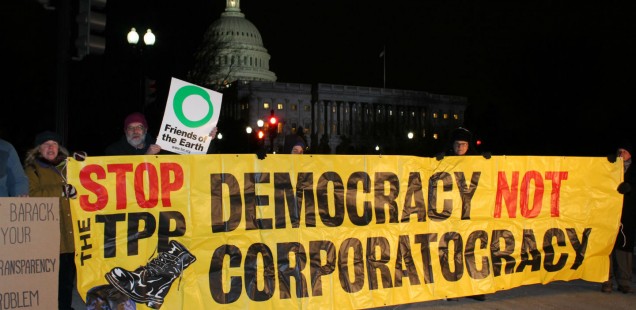TPP: setback for intellectual property policies | PirateTimes

Trans-Pacific Partnership: A Setback for Intellectual Property Policies
The TPP (Trans-Pacific Partnership trade agreement) has been finalized. Now that the negotiators have agreed on the text all that is left is approval by the twelve involved nations: Canada, USA, Mexico, Peru, Chile, New Zealand, Australia, Singapore, Malaysia, Vietnam, Brunei and Japan. However, none of these countries will let their people decide about it in a referendum.
Most of what we know about TPP has come through leaks to the press, since the negotiations have been clouded in secrecy. Last week the latest leak came from Wikileaks which was about the Intellectual Property provisions. Something that might also give us a hint about what was intended with the trade deal for EU and US (TTIP). From the more than 60 pages on the IP chapter, here are the most relevant issues:
Trade secrets
This point is very important to journalists or whistleblowers because they could not be able to investigate about trades and report on them to the public.
1. In the course of ensuring effective protection against unfair competition as provided in Article 10bis of the Paris Convention, each Party shall ensure that natural and legal persons have the legal means to prevent trade secrets lawfully in their control from being disclosed to, acquired by, or used by others (including state commercial enterprises) without their consent in a manner contrary to honest commercial practices. As used in this Chapter, trade secrets encompass, at a minimum, undisclosed information as provided for in Article 39.2 of the TRIPS Agreement.
2. Subject to Paragraph 3, Each Party shall provide for criminal procedures and penalties for one or more of the following:
(a) the unauthorized, willful access to a trade secret held in a computer system;
(b) the unauthorized, willful misappropriation of a trade secret, including by means of a computer system; or
(c) the fraudulent disclosure, or alternatively, the unauthorized and willful disclosure of a trade secret, including by means of a computer system.
3. With respect to the acts referred to in Paragraph 2, a Party may, where appropriate, limit the availability of such criminal procedures, or limit the level of penalties available, to one or more of the following cases:
(a) the acts are for purposes of commercial advantage or financial gain;
(b) the acts are related to a product or service in national or international commerce;
(c) the acts are intended to injure the owner of such trade secret;
(d) the acts are directed by or for the benefit of or in association with a foreign economic entity; or (e) the acts are detrimental to a Party’s economic interests, international relations, or national defense or national security.”
Patents
The text announced that TPP could patent inventions that are “derived from” animals or plants. Most of the TPP countries have legislation that prohibit patenting plants or animals.
Article QQ.E.1: {Patentable Subject matter}: 4. Each Party may also exclude from patentability plants other than microorganisms. However, consistent with paragraph 1 and subject to paragraph 3, each Party confirms that patents are available at least for inventions that are derived from plants.”
TPM (Technological Protection Measures)
It’s obliged to criminalize certain practices and uses of digital content.
Article QQ.G.10: {Technological Protection Measures}
(a) In order to provide adequate legal protection and effective legal remedies against the circumvention of effective technological measures that authors, performers, and producers of phonograms use in connection with the exercise of their rights and that restrict unauthorized acts in respect of their works, performances, and phonograms, each Party shall provide that any person who:
(i) knowingly, or having reasonable grounds to know, circumvents without authority any effective technological measure that controls access to a protected work, performance, or phonogram; or
(ii) manufactures, imports, distributes, offers for sale or rental to the public, or otherwise provides devices, products, or components, or offers to the public or provides services, that:
(A) are promoted, advertised, or otherwise marketed by that person for the purpose of circumventing any effective technological measure;
(B) have only a limited commercially significant purpose or use other than to circumvent any effective technological measure; or
(C) are primarily designed, produced, or performed for the purpose of circumventing any effective technological measure, shall be liable and subject to the remedies set out in Article QQ.H.4.17 (Civil Judicial Proceedings relating to TPMs and RMIs).
Each Party shall provide for criminal procedures and penalties to be applied where any person is found to have engaged willfully and for the purposes of commercial advantage or financial gain in any of the above activities. Each Party may provide that such criminal procedures and penalties do not apply to a non-profit library, museum, archive, educational institution, or public non-commercial broadcasting entity. A Party may also provide that the remedies set out in Article QQ.H.4.17 (Civil Judicial Proceedings relating to TPMs and RMIs) do not apply to those same entities provided that the above activities are carried out in good faith without knowledge that the conduct is prohibited.”
Copyright
In most of the countries (except the US, which already has it), TPP will increase protection another 20 years, it means 70 years after the author’s death. There are also mandatory criminal sanctions against the circumvention of technological protection measures (Digital Rights Management, or DRM):
Article QQ.G.6: {Term of Protection for Copyright and Related Rights}
Each Party shall provide that, where the term of protection of a work (including a photographic work), performance, or phonogram is to be calculated:
(a) on the basis of the life of a natural person, the term shall be not less than the life of the author and 70 years after the author’s death; and
(b) on a basis other than the life of a natural person, the term shall be:
(i) not less than 70 years from the end of the calendar year of the first authorized publication of the work, performance, or phonogram; or
(ii) failing such authorized publication within 25 years from the creation of the work, performance, or phonogram, not less than 70 years from the end of the calendar year of the creation of the work, performance, or phonogram.”
ISP (Internet Service Providers)
TPP maintains ISPs as content handlers. The treatment requires countries to create legal incentives to cooperate with copyright holders to discourage or take actions against the storage or transmission of infringing content, effectively making ISPs have to spy on their own customers:
Section I: {Internet Service Providers}
1. The Parties recognize the importance of facilitating the continued development of legitimate online services operating as intermediaries and, in a manner consistent with Article 41 of the TRIPS Agreement, providing enforcement procedures that permit effective action by rights holders against copyright infringement covered under this Chapter that occurs in the online environment. Accordingly, each Party shall ensure that legal remedies are available for rights holders to address such infringement and shall establish or maintain appropriate safe harbors in respect of online services that are Internet Service Providers. This framework of legal remedies and safe harbors shall include:
(a) legal incentives for Internet Service Providers to cooperate with copyright owners to deter the unauthorized storage and transmission of copyrighted materials or, in the alternative, to take other action to deter the unauthorized storage and transmission of copyrighted materials; and
(b) limitations in its law that have the effect of precluding monetary relief against Internet Service Providers for copyright infringements that they do not control, initiate, or direct, and that take place through systems or networks controlled or operated by them or on their behalf.”
TPP is not good for people, for authors, or for democracy. TPP is a way to export the private censorship request. TPP aims to overload the judicial system of each country. It establishes measures to detect suspicious that infringing intellectual property, new presumptions in favor of rights holders, and rising standards of criminal penalties for decryption.
TPP squanders the opportunity to have a serious and open discussion about the role of copyrights in the Digital Century. There is no discussion of end users’ rights. The next step is in the hands of each nation’s legislature, but I hope the people of each of these 12 countries take to the streets to say no to TPP or any mesures against the people’s rights.
Featured image: Stop FastTrack / CC BY 2.0

About Lorena Müller
I’m an Italian-Argentinean citizen living in Madrid, Spain since 2002. I’m
photographer, social media and IT consultant. I’m 15M (Indignados) activist.
I joined the Pirate movement in 2013 as an active member, working on amendments for the last European elections’ Common European Pirate Program and managing our social networks.
Currently I’m also the Confederación Pirata chairwoman.
I believe in liquid democracy, active participation in public life and left wing ideology. I’m feminist, antifascist and pirate.
Without Human Rights there is not any Democracy.
P-)
All content is CC-BY if not mentioned otherwise. Please link back to us if using content.
















efwsafdf
Josef Ohlsson Collentine